Seven people were killed by a bomb that tore through a bus in the Nairobi suburb of Eastleigh on Sunday 18 November.
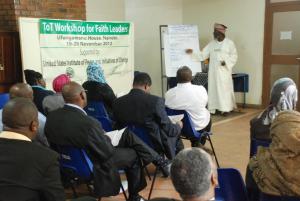 At the time of the explosion, Imam Muhammad Ashafa and Pastor James Wuye were addressing a group of Muslim and Christian leaders in Eastleigh. During the night there were reprisal attacks, leaving six people dead.
At the time of the explosion, Imam Muhammad Ashafa and Pastor James Wuye were addressing a group of Muslim and Christian leaders in Eastleigh. During the night there were reprisal attacks, leaving six people dead.
Pastor James Wuye and Imam Muhammad Ashafa were in Kenya (17-25 November) to run two ‘training of trainers’ workshops for peace practitioners, supported by the United States Institute of Peace (USIP) and Initiatives of Change (IofC).
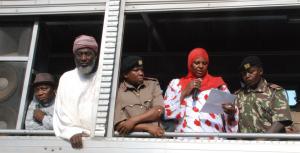 The first workshop brought together faith leaders invited by the Supreme Council of Kenyan Muslims (SUPKEM) and the National Council of Churches of Kenya (NCCK), together with lecturers in Christian-Muslim relations from St Paul’s University, Limuru, and activists from flashpoints of conflict, including Eastleigh and Kibera.
The first workshop brought together faith leaders invited by the Supreme Council of Kenyan Muslims (SUPKEM) and the National Council of Churches of Kenya (NCCK), together with lecturers in Christian-Muslim relations from St Paul’s University, Limuru, and activists from flashpoints of conflict, including Eastleigh and Kibera.
Just after the workshop had started, one of the participants received news that her brother had been murdered in random reprisals.
Sheikh Hassan Omari, Assistant Director of Religious Affairs for SUPKEM, urged Pastor James and Imam Ashafa to respond to the crisis. During a late night meeting, the two 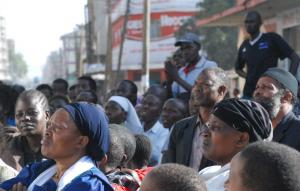 Nigerians and the USIP/IofC project team formulated a plan to take the entire workshop group to Eastleigh the following day.
Nigerians and the USIP/IofC project team formulated a plan to take the entire workshop group to Eastleigh the following day.
By the morning, it was clear that over-night rioting had been quelled and calm restored. With invitations from George Natembeya, District Commissioner of Kamakunji, and Hon Hassan Yusuf, MP for Eastleigh, together with guarantees of security, the group felt it right to proceed.
Imam Ashafa and Pastor James boarded an open-air truck with senior Kenyan officials, laid on by the Ministry of Provincial Administration and Internal Security, and toured the streets of the ravaged area. They called on the crowds that quickly gathered ‘not to make the same mistakes that have been made in Nigeria’.
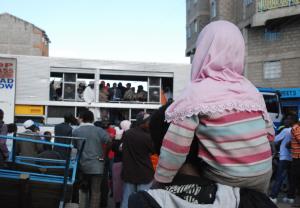 They encouraged one Muslim and one Christian leader from the workshop to read a Peace Declaration, which had been agreed upon that morning:
They encouraged one Muslim and one Christian leader from the workshop to read a Peace Declaration, which had been agreed upon that morning:
‘In the light of recent happenings and especially the one that occurred on Sunday at Eastleigh, where innocent lives were destroyed, we mourn with the families of the victims.
Amidst their cries, we hear an even louder clarion call as faith leaders in Kenya, men and women, to come together in solidarity with the bereaved families to work towards addressing this violence. We are committed to moving our country forward together to build a peaceful Kenya.
We appeal to all Kenyans, political leaders, youths, women groups and other non-state actors to play politics without bitterness and to shun all politics of identity and religion at this critical moment of political transition in our nation’s history.
We call on the government to listen and dialogue with all aggrieved persons and put an end to the destruction of lives and property of their citizens.
We condemn the misuse and abuse of religion and call on religious leaders to use their various platforms to advocate for peaceful and harmonious co-existence in Kenya.’
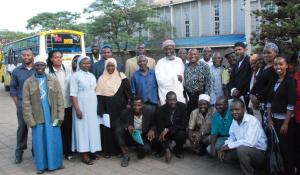 It was a timely act of healing and reconciliation; the first visit by faith leaders to the scene of the blast.
It was a timely act of healing and reconciliation; the first visit by faith leaders to the scene of the blast.
The inter-faith team forged by Pastor James and Imam Ashafa continues with renewed conviction that peaceful coexistence in Kenya will not be disrupted by the isolated acts of criminals.
This work is part of an on-going project to transfer the peace-building methodologies depicted in the documentary film An African Answer across Kenya. The project is supported by the United States Institute of Peace and Initiatives of Change.
Photos by Alan Channer
